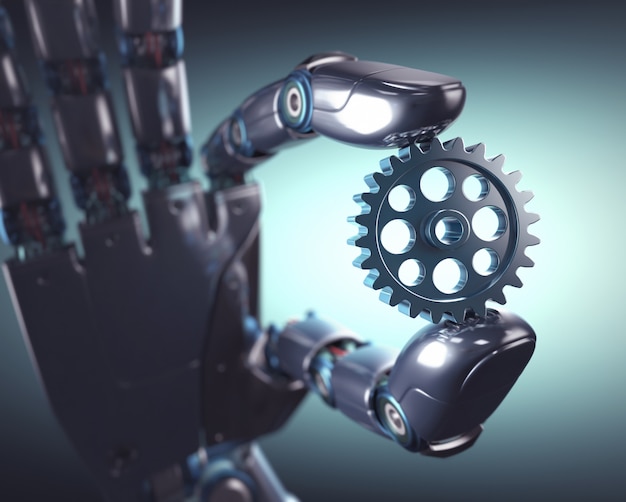The Future of Work in the US: Innovations and Job Market Transformation

The US job market is undergoing a profound transformation driven by technological advancements, automation, and evolving workforce demographics, leading to new opportunities and challenges for workers and employers alike.
The **future is now: exploring the latest innovations transforming the US job market**, and it’s a landscape of rapid change. Automation, artificial intelligence, and shifting demographics are reshaping industries and creating entirely new roles. Understanding these trends is crucial for both job seekers and employers.
The Rise of Automation and AI in the Workplace
Automation and AI are no longer futuristic concepts; they’re integral parts of today’s workplace. These technologies are streamlining processes, increasing efficiency, and changing the skill sets required for many jobs. It’s essential to examine how these advancements are impacting various sectors.
Automation’s Impact on Manufacturing and Production
Automation has significantly impacted manufacturing, leading to increased productivity and reduced labor costs. However, this also raises concerns about job displacement and the need for workforce retraining.
AI-Powered Decision-Making and its Implications
AI is being used increasingly for decision-making processes in various industries, from finance to healthcare. This can improve accuracy and efficiency, but it also raises ethical questions about bias and accountability.
- The increasing use of robotics in manufacturing plants.
- AI algorithms analyzing data to predict market trends.
- Automated customer service chatbots handling routine inquiries.

Automation and AI are reshaping the US job market by automating tasks and increasing efficiency, but also lead to job displacement and create new demands for skilled workers who can manage and maintain these technologies. Understanding these trends is critical for workers and employers to adapt to the changing landscape.
The Growing Demand for Tech Skills
As technology becomes more pervasive, the demand for tech skills is soaring across all industries. From software development to data analysis, professionals with a strong understanding of technology are highly sought after. This trend is expected to continue, creating significant opportunities in the tech sector.
Software Development and Cybersecurity
Software development remains a critical area of growth, with companies constantly seeking developers proficient in various programming languages. Cybersecurity is also a major concern, driving demand for security experts.
Data Science and Analytics
The ability to collect, analyze, and interpret data is becoming increasingly valuable. Data scientists and analysts are needed to help organizations make informed decisions and gain a competitive edge.

The growing demand for tech skills is reshaping the job market, with increasing requirements for roles that cover new tech fields, such as Cybersecurity, Big Data, and AI. Acquiring tech skills through education and training is essential for workers and companies to secure their future workforce success.
The Gig Economy and Remote Work Revolution
The gig economy and remote work have transformed the way people work, providing greater flexibility and autonomy. This shift has been accelerated by the pandemic, with many companies embracing remote work as a long-term solution. It’s essential to understand the implications of this trend for both workers and employers.
The Rise of Freelancing and Independent Contractors
More people are choosing to work as freelancers or independent contractors, taking on projects for various clients. This offers flexibility and control over their careers but also comes with challenges such as income instability and lack of benefits.
The Impact of Remote Work on Work-Life Balance
Remote work has the potential to improve work-life balance, allowing employees to work from anywhere and manage their schedules more effectively. However, it can also blur the lines between work and personal life, leading to burnout.
- The increasing popularity of online platforms connecting freelancers with clients.
- The growing number of companies offering remote work options.
- The challenges of managing remote teams and maintaining productivity.
The Gig Economy and Remote Work are transforming the work model by empowering professionals with increased flexibility and autonomy, while posing new challenges such as income instability, blurred work-life balance, and the need for effective management of remote teams.
The Importance of Lifelong Learning and Upskilling
In today’s rapidly changing job market, lifelong learning and upskilling are essential for staying relevant and competitive. Workers need to continuously acquire new skills and knowledge to adapt to evolving job requirements. Companies also have a role to play in providing training and development opportunities for their employees.
Online Courses and Vocational Training
Online courses and vocational training programs offer accessible and affordable ways for workers to acquire new skills. These programs can help individuals enhance their existing skills or transition to new careers.
Corporate Training and Development Programs
Companies are increasingly investing in training and development programs to equip their employees with the skills they need to succeed. These programs can improve employee productivity, engagement, and retention.
Lifelong learning and upskilling are critical for workers to remain competitive and adapt to new job requirements. This is achieved through accessible online courses and vocational training, in addition to corporate programs designed to equip employees with the skills needed to thrive, improving productivity and engagement.
The Shift Towards Human Skills
While technical skills are undoubtedly important, there’s a growing recognition of the importance of human skills, also known as soft skills. These include communication, collaboration, creativity, and critical thinking. These skills are difficult to automate and are essential for success in many roles.
Communication and Collaboration
Effective communication and collaboration are essential for teamwork and building strong relationships. Employees who can communicate clearly and work well with others are highly valued.
Creativity and Problem-Solving
Creativity and problem-solving skills are essential for innovation and adapting to new challenges. Employees who can think outside the box and come up with innovative solutions are highly sought after.
- The increasing emphasis on emotional intelligence in the workplace.
- The importance of cross-cultural communication in a globalized world.
- The need for critical thinking to navigate complex information.
The Job Market increasingly values soft skills, also known as human skills, such as communication, collaboration, creativity, and critical thinking. Soft skills are essential for teamwork and innovation, since they are difficult to automate and contribute to navigating a work environment in constant flux.
The Impact of Demographic Shifts on the Workforce
Demographic shifts are significantly impacting the composition of the workforce, with an aging population and increasing diversity. These shifts create both challenges and opportunities for employers. Understanding these trends is crucial for creating inclusive and equitable workplaces.
The Aging Workforce and Retirement Trends
As the population ages, more people are delaying retirement or working part-time in their later years. This creates a need for employers to adapt to the needs of older workers and provide flexible work arrangements.
Increasing Diversity and Inclusion
The workforce is becoming increasingly diverse, with more women, people of color, and members of the LGBTQ+ community entering various professions. Employers need to foster inclusive workplaces that value diversity and promote equity.
Demographic shifts, such as an aging population and increasing diversity, are transforming the workforce, driving employers to adapt by providing flexible work arrangements for older workers and fostering inclusive workplaces for a diverse workforce.
| Key Point | Brief Description |
|---|---|
| 🤖 Automation & AI | Reshaping jobs; requires upskilling to manage new technologies. |
| 💻 Tech Skills Demand | Soaring: Software, cybersecurity, and data analytics are key. |
| 💼 Gig Economy | Offers flexibility but poses challenges on stability and balance. |
| 🧑🤝🧑 Human Skills | Essential for relationships and teamwork in the workplace. |
Frequently Asked Questions
▼
AI is creating new jobs in fields like AI development, data science, and AI management, while also enhancing productivity in existing roles, allowing workers to focus on more strategic tasks.
▼
Currently, the most in-demand tech skills include cybersecurity, data analysis, cloud computing, and software development. Skills in AI and machine learning are also highly valued.
▼
To prepare for the future of work, focus on continuous learning, develop strong technical skills, enhance your soft skills, and stay informed about industry trends and emerging technologies.
▼
Companies must provide training and development opportunities, promote a culture of lifelong learning, foster diversity and inclusion, and adapt to the changing needs of the workforce.
▼
Numerous online platforms like Coursera, edX, and Udemy offer courses in various fields. Vocational training programs and community colleges also provide valuable skills training.
Conclusion
The US job market is in a state of constant evolution, driven by technological advancements, demographic shifts, and changing work preferences. By understanding these trends and investing in lifelong learning, both workers and employers can adapt and thrive in the future of work.
